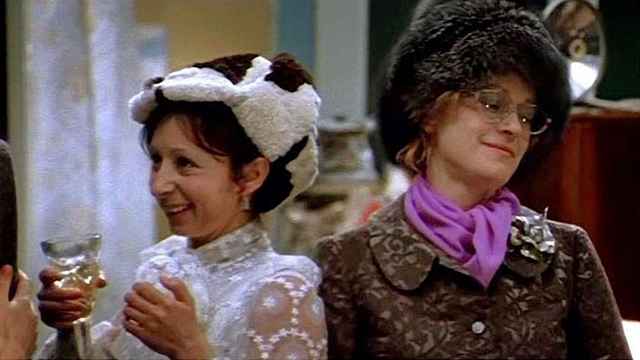A visit to the Fomenko Studio a few days ago got me thinking. Actually, it wasn't the visit itself, it was an image I saw that made me stop and look and think.
Projected on one of the central columns in the foyer of the Studio's new building was a black-and-white portrait of Pyotr Fomenko. As you can see in the photo above, it is a beautiful, tasteful, even moving tribute to the man who founded the theater two decades ago and who died Aug. 9 at the age of 80.
But it is also a haunting and ghostly image. Standing before that portrait of Fomenko in Fomenko's theater I felt even more strongly that Fomenko was gone, and that I had wandered into a place that either I knew no longer or I did not yet know. I surely will reconnect with this theater in some new way, but for that moment of standing and looking I was in no man's land. This theater was no longer what it used to be, and it had not yet become what it will be in the future.
I then cast the net of my thoughts a little further. Increasingly, as I enter theaters this season I will encounter uncharted territory. Sometimes quietly, sometimes in loud, scandalous bursts, the making of theater in Moscow is passing into new hands. The theaters we enter tomorrow will have the same addresses and the same walls but often enough they will not be the same places we entered yesterday.
This process began some time ago, but it had not yet gained full momentum. The death of Pyotr Fomenko came at a time when it can be perceived as a sign, the summing up of an era of change.
Last season we had the extraordinary experience of walking into the Taganka in the nascent days of its post-Lyubimov era. Yury Lyubimov founded the Taganka in 1964 and, despite being cast into exile in the West from 1984 to 1989, his name and that of his theater were always associated together. That is now over. Lyubimov is Lyubimov and the Taganka has taken a new road without him. Never shall that twain meet again.
The next time I walk into the Yermolova Theater it will be a radically changed institution. After decades under the leadership of Vladimir Andreyev (aside from a five-year break in the late 1980s, he ran the theater from 1970 to 2012), the venue has passed into the hands of Oleg Menshikov, arguably Russia's most popular actor of film and stage. A sensitive artist and a shrewd businessman, Menshikov will surely apply a completely different vision to the theater's affairs.
My next visit to the Gogol Theater will be a journey of discovery. Sergei Yashin ran this playhouse for 25 years until he was fired in August and replaced by Kirill Serebrennikov. The Gogol was never a center for innovation, but in the last decade it almost entirely dropped off the map of theaters worthy of attention. Serebrennikov, who is 43 and a leading symbol of a brash generation that made its considerable mark over the last decade, has already indicated that he expects to effect a complete overhaul of the way the theater functions.
All of these events, occurring within a 13-month span, are game changers for the face of Moscow theater. And they are not alone, for they come amid a general atmosphere of change.
Here is just a partial list of recent turnovers in the artistic management of key Moscow theaters: The death of Pushkin Theater artistic director Roman Kozak in 2010; the appointment of Mindaugas Karbauskis to head the Mayakovsky Theater in 2011; the appointment of Mikhail Ugarov as artistic director of the Playwright and Director Center in 2011; Viktor Ryzhakov's replacement of Valery Fokin as artistic director of the Meyerhold Center in 2011; Mikhail Durnenkov's replacement of Mikhail Ugarov as artistic director of the Lyubimovka Festival in 2012; the announcement that playwright Ivan Vyrypayev will become artistic director of Praktika Theater in April 2013.
I would suggest that we are currently witnessing a remaking of Moscow theater on a scale that has not happened since the perestroika era in the late 1980s.
Fomenko, not incidentally, was one of the great triumphs of that period. Throughout the 1970s and '80s he struggled to find work. The new freedoms of the late 1980s and early 1990s made it possible for him to emerge late in life as one of Russian theater's most important, vital artists.
With Fomenko's passing we begin the process of watching his life and his work recede into history. But what we also see is that large numbers of theaters are undergoing similar radical change, albeit usually for different reasons. The upshot is this: the theater we have known in this city for years will soon look as ghostly as that portrait of Fomenko in the theater bearing his name. What comes next will be the new story of a new era.
A Message from The Moscow Times:
Dear readers,
We are facing unprecedented challenges. Russia's Prosecutor General's Office has designated The Moscow Times as an "undesirable" organization, criminalizing our work and putting our staff at risk of prosecution. This follows our earlier unjust labeling as a "foreign agent."
These actions are direct attempts to silence independent journalism in Russia. The authorities claim our work "discredits the decisions of the Russian leadership." We see things differently: we strive to provide accurate, unbiased reporting on Russia.
We, the journalists of The Moscow Times, refuse to be silenced. But to continue our work, we need your help.
Your support, no matter how small, makes a world of difference. If you can, please support us monthly starting from just $2. It's quick to set up, and every contribution makes a significant impact.
By supporting The Moscow Times, you're defending open, independent journalism in the face of repression. Thank you for standing with us.
Remind me later.






